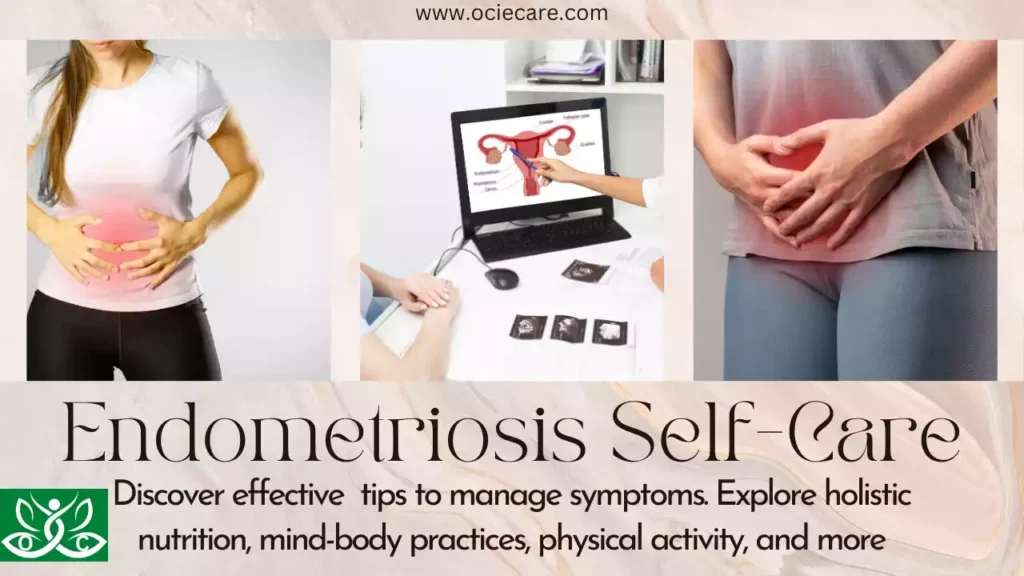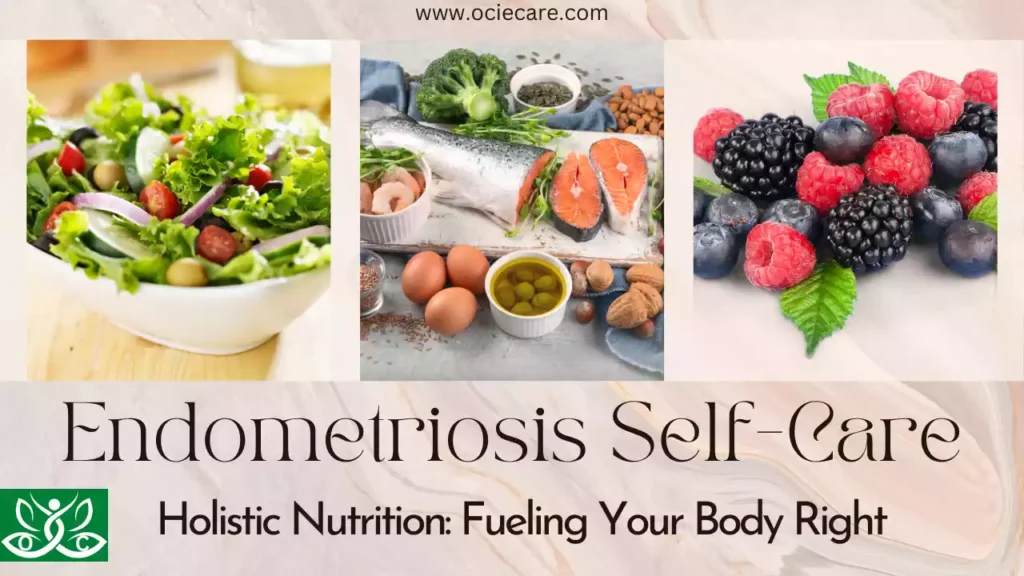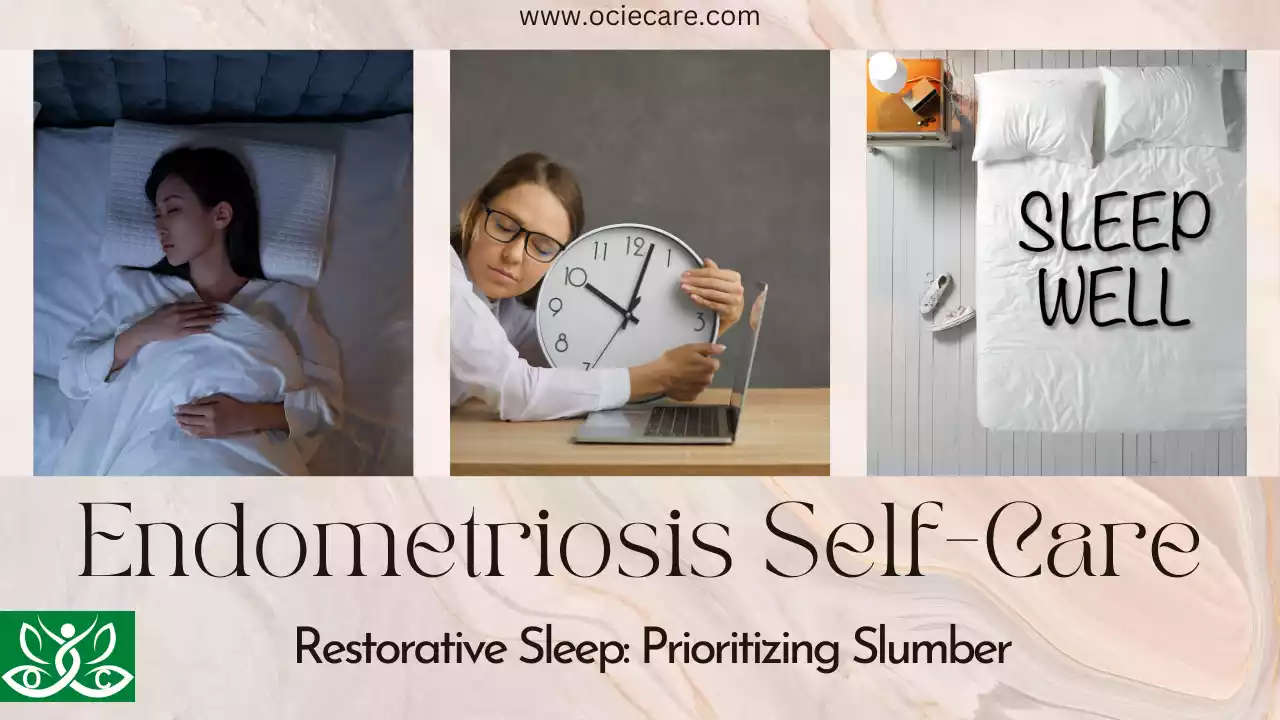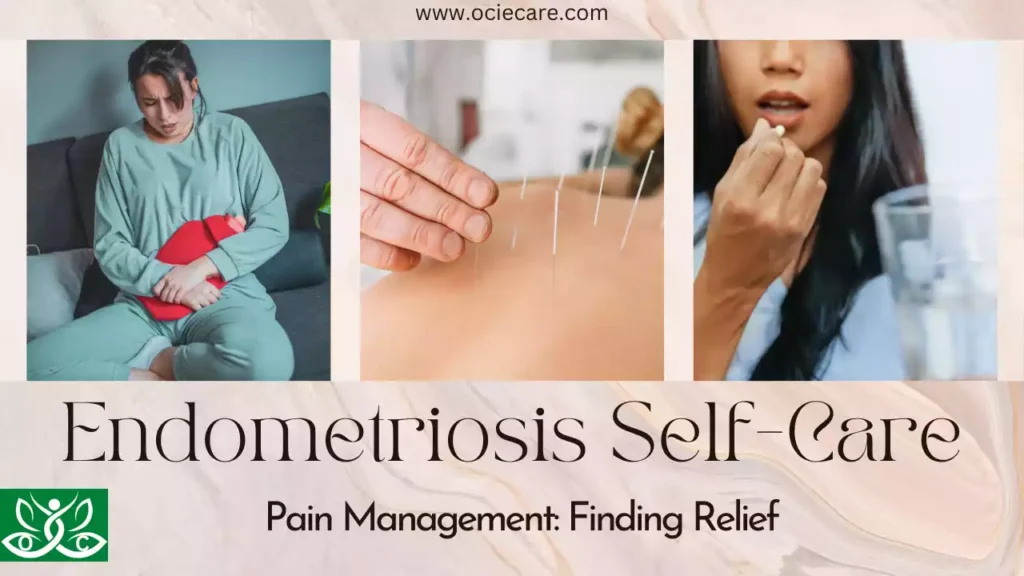Discover effective endometriosis self-care tips to manage symptoms. Explore holistic nutrition, mind-body practices, physical activity, and more. Empower yourself today.
In today’s fast-paced world, it’s essential to prioritize self-care, especially for those who battle with endometriosis. This article delves into the realm of endometriosis self-care, offering insights, strategies, and tips to empower individuals in managing their condition and embracing a healthier, more fulfilling life.

Understanding Endometriosis
Before we embark on the journey of self-care, let’s grasp the fundamentals of endometriosis. This condition occurs when tissue similar to the lining of the uterus grows outside it. It leads to pain, inflammation, and sometimes fertility issues. We’re here to guide you through the maze of self-care techniques that can make a real difference in your life.
Endometriosis Self-Care
Endometriosis Self-Care isn’t selfish; it’s a necessity. By nurturing your physical, emotional, and mental well-being, you equip yourself to better manage endometriosis. Let’s explore the strategies that can bring about a positive transformation in Endometriosis Self-Care.
A. Holistic Nutrition: Fueling Your Body Right

Proper nutrition isn’t just about what you eat; it’s about providing your body with the right fuel to function at its best, especially when dealing with endometriosis. Holistic nutrition takes into account the whole person – body, mind, and spirit – and aims to support overall well-being.
When managing endometriosis symptoms, it’s important to focus on foods that have anti-inflammatory properties. Incorporating these foods into your diet can help alleviate pain and discomfort.
Here are some key foods to consider:
I. Leafy Greens:
- Vegetables like spinach, kale, and Swiss chard are rich in vitamins, minerals, and antioxidants that support your immune system and reduce inflammation.
II. Fatty Fish:
- Fish like salmon, mackerel, and sardines are high in omega-3 fatty acids, which have anti-inflammatory effects and can help ease pain.
III. Berries:
- Blueberries, strawberries, and raspberries are packed with antioxidants that combat inflammation and support overall health.
On the flip side, some foods can exacerbate inflammation and should be limited or avoided:
I. Processed Foods:
- Foods high in refined sugars, artificial additives, and unhealthy fats can trigger inflammation and worsen symptoms.
II. Caffeine:
- While that morning cup of coffee might seem tempting, too much caffeine can contribute to inflammation and disrupt sleep patterns.
III. Alcohol:
- Alcohol can disrupt hormonal balance and increase inflammation, making it wise to consume in moderation or avoid it altogether.
Remember, everyone’s body is unique, so it’s important to listen to yours. Keeping a food diary can help you identify how different foods affect your symptoms and will help in Endometriosis Self-Care. Consulting a registered dietitian can provide personalized guidance on creating a nutrition plan that works best for you.
B. Mind-Body Connection: Cultivating Inner Harmony

Dealing with endometriosis can take both a physical and emotional toll. Engaging in practices that nurture the mind-body connection can greatly improve your overall well-being and help manage symptoms as part of Endometriosis Self-Care.
I. Meditation:
- Taking a few minutes each day to meditate can help calm the mind, reduce stress, and promote relaxation.
- Find a quiet space, sit comfortably, and focus your attention on your breath or a specific mantra.
- Over time, this practice can help you manage pain and enhance your mental resilience.
II. Yoga:
- Yoga combines gentle movement with mindful breathing, making it an excellent practice for those with endometriosis.
- Certain yoga poses can improve blood circulation, reduce tension, and alleviate pain.
- Look for classes or videos that cater to beginners or focus on poses that suit your comfort level.
III. Deep Breathing:
- Practicing deep, diaphragmatic breathing can activate the body’s relaxation response and reduce stress.
- Find a quiet place, sit or lie down comfortably, and inhale deeply through your nose, allowing your belly to expand.
- Exhale slowly through your mouth. Repeat this several times, focusing on each breath.
The mind-body connection is powerful – when your thoughts are in harmony with your physical body, you’re better equipped to cope with the challenges of Endometriosis Self-Care. Regular practice of these techniques can lead to improved emotional well-being and a greater sense of control over your symptoms.
C. Physical Activity: Moving with Purpose

Engaging in regular physical activity can have a significant positive impact on managing endometriosis symptoms as a part of Endometriosis Self-Care. Exercise isn’t just about maintaining a healthy weight; it’s about promoting blood circulation, enhancing mood, and releasing endorphins – those wonderful natural pain relievers.
I. Benefits of Exercise:
a. Blood Circulation:
- Physical activity improves blood flow, which can reduce inflammation and alleviate pain associated with endometriosis.
b. Endorphin Release:
- When you exercise, your body releases endorphins – chemicals that act as natural painkillers and mood enhancers.
c. Stress Reduction:
- Exercise can help reduce stress and anxiety, both of which can exacerbate endometriosis symptoms.
d. Hormonal Balance:
- Regular exercise can help balance hormones, which may play a role in managing endometriosis-related issues.
II. Low-Impact Activities:
While exercise is crucial, it’s essential to choose activities that don’t strain your body. Low-impact exercises are gentle on your joints and muscles while still providing incredible benefits. Some suitable options include:
a. Walking:
- A simple yet effective exercise that gets your blood flowing and clears your mind.
b. Swimming:
- The buoyancy of water reduces the impact on your joints while providing an excellent cardiovascular workout.
c. Pilates:
- This low-impact exercise focuses on strengthening your core muscles, enhancing flexibility, and improving posture.
Remember, the goal isn’t to push yourself to extremes but rather to engage in activities that make you feel good. Start slowly and gradually increase your activity level. Always listen to your body – if something feels uncomfortable or painful, it’s okay to adjust or take a break.
D. Restorative Sleep: Prioritizing Slumber

Sleep isn’t a luxury; it’s a fundamental requirement for overall health and well-being. When you have endometriosis, quality sleep becomes even more important as it directly impacts your body’s ability to heal and recover.
I. Creating a Sleep-Conducive Environment:
a. Comfortable Bed:
- Invest in a comfortable mattress and pillows that provide proper support for your body.
b. Dark and Quiet:
- Keep your bedroom dark and quiet to create an optimal sleep environment.
c. Temperature Control:
- Maintain a comfortable room temperature – not too hot or too cold.
II. Consistent Sleep Schedule:
- Try to go to bed and wake up at the same times every day, even on weekends.
- A consistent sleep schedule helps regulate your body’s internal clock, making it easier to fall asleep and wake up naturally.
III. Unwinding Before Bed:
- Develop a pre-sleep routine to signal to your body that it’s time to wind down.
- Avoid screens (phones, tablets, computers) at least an hour before bed, as blue light can interfere with melatonin production, a hormone that regulates sleep.
IV. The Healing Power of Sleep:
- During sleep, your body repairs itself, consolidates memories, and regulates hormones.
- Adequate sleep can reduce inflammation, improve immune function, and enhance overall well-being.
- It’s not just about the quantity of sleep, but the quality as well.
By prioritizing restorative sleep, you’re allowing your body to heal and rejuvenate, which is especially crucial when managing the challenges of endometriosis.
E. Pain Management: Finding Relief

Dealing with pain is a significant aspect of managing endometriosis. While self-care strategies can help alleviate discomfort, having a toolkit of pain management techniques is essential for those challenging moments when the pain feels overwhelming.
I. Heat Therapy:
- Applying heat to the lower abdomen can provide quick relief from menstrual cramps and pelvic pain.
- A heating pad or warm bath can help relax tense muscles and improve blood circulation to the affected area.
II. Acupuncture:
- This ancient practice involves inserting thin needles into specific points on the body.
- Many individuals with endometriosis find relief from pain through acupuncture sessions.
- It’s believed that acupuncture stimulates the release of endorphins and promotes the body’s natural healing mechanisms.
III. Over-the-Counter Pain Relievers:
- Non-prescription pain relievers like ibuprofen or naproxen can help manage mild to moderate pain associated with endometriosis.
- However, it’s important not to rely solely on these medications and to use them under the guidance of a healthcare professional.
IV. Consult Your Healthcare Provider:
- Pain management is a personalized journey, and what works for one person might not work for another.
- It’s crucial to consult your healthcare provider before embarking on any new pain management strategy.
- They can assess your situation, provide recommendations, and ensure that the chosen methods are safe and effective for you.
V. Combining Techniques:
- Many individuals find that a combination of techniques works best for them.
- For example, you might use heat therapy at home and incorporate acupuncture sessions as needed.
- The key is to tailor your approach to what brings you the most relief.
Remember, pain management is about finding a balance between addressing discomfort and maintaining your overall well-being. Open communication with your healthcare provider is essential in making informed decisions and choosing the best pain relief strategies for your specific needs.
Crafting Your Self-Care Routine
Now that we’ve highlighted the key strategies, let’s tailor them to a personalized self-care routine.
A. Morning Rituals: Energizing Your Day
Mornings set the tone for the rest of the day, and establishing a positive routine can make a significant difference, especially when dealing with endometriosis. Here’s how you can create a morning ritual that energizes you and prepares you for the day ahead.
I. Gentle Stretches:
- Upon waking, take a few moments to perform gentle stretches.
- These can help awaken your muscles, improve circulation, and alleviate any stiffness that might have accumulated overnight.
- Consider simple stretches like reaching your arms overhead, gently twisting your torso, and stretching your legs.
II. Brief Meditation:
- Before the hustle and bustle of the day begins, spend a few minutes in meditation.
- Find a quiet spot, sit comfortably, and focus your attention on your breath.
- Inhale deeply through your nose, feeling your lungs expand, and exhale slowly through your mouth.
- As thoughts arise, gently bring your focus back to your breath.
- This practice can help calm your mind, reduce stress, and set a positive intention for the day.
III. Nutritious Breakfast:
- Fueling your body with the right nutrients in the morning is essential.
- Enjoy a breakfast that includes a balance of complex carbohydrates, protein, and healthy fats.
Consider options like:
a. Oatmeal:
- A warm bowl of oatmeal topped with berries, nuts, and a drizzle of honey provides sustained energy and essential vitamins.
b. Greek Yogurt:
- Pair Greek yogurt with fresh fruit and a sprinkle of granola for a protein-packed and satisfying start to your day.
c. Smoothie:
- Blend together fruits, leafy greens, a scoop of protein powder, and a splash of almond milk for a refreshing and nutrient-rich breakfast.
d. Whole-Grain Toast:
- Top whole-grain toast with avocado, a poached egg, and a sprinkle of black pepper for a savory and nourishing option.
Starting your day with gentle movement, mindfulness, and a nourishing breakfast can set a positive tone for the hours ahead. It’s all about creating a routine that caters to your well-being and empowers you to face any challenges that may come your way.
Navigating a workday while managing endometriosis requires attention to your well-being throughout the day. Here are some strategies to incorporate into your routine to ensure you’re taking care of yourself even during busy hours.
I. Short Breaks and Stretching:
- During your workday, make it a point to take short breaks to stretch and relax.
- Prolonged sitting can lead to muscle tension and discomfort.
- Stand up, stretch your arms overhead, roll your shoulders, and gently twist your torso.
- These simple movements can help alleviate stiffness and improve blood circulation.
II. Healthy Snacking:
- Keeping your energy levels steady is essential when dealing with endometriosis.
- Instead of relying on quick fixes like sugary snacks or caffeinated beverages, opt for healthy snacks that provide sustained energy.
Some options include:
a. Nuts and Seeds:
- Almonds, walnuts, and sunflower seeds are packed with healthy fats and protein to keep you satisfied.
b Fresh Fruit:
- Apples, berries, and oranges provide natural sugars and vitamins that can boost your energy.
c. Greek Yogurt:
- A small serving of Greek yogurt with a drizzle of honey and a sprinkle of granola offers a balance of protein and carbohydrates.
d. Vegetable Sticks with Hummus:
- Carrot, cucumber, and bell pepper sticks paired with hummus make for a satisfying and nutritious snack.
III. Hydration:
- Don’t forget to stay hydrated throughout the day.
- Drinking enough water helps maintain your energy levels and supports overall well-being.
- Keep a water bottle at your desk as a reminder to stay on top of your hydration.
IV. Mindful Breathing:
- When stress begins to build up during your workday, take a moment to practice mindful breathing.
- Close your eyes, inhale deeply through your nose, counting to four, and exhale slowly through your mouth, counting to six.
- This can help calm your nervous system and reduce stress.
By incorporating short breaks, healthy snacks, and mindful practices into your workday, you’re prioritizing your well-being and effectively managing your endometriosis. Remember, it’s the small, consistent actions that add up to create a healthier and more balanced lifestyle.
C. Evening Wind-Down: Preparing for Rest
As the day comes to a close, transitioning into a calming evening routine can greatly improve your sleep quality and overall well-being, especially when managing endometriosis. Here’s how you can create an evening wind-down routine that supports relaxation and restful sleep.
I. Create a Relaxing Environment:
- Prepare your bedroom for a peaceful night’s sleep.
- Dim the lights, adjust the room temperature to your comfort, and consider using soft, breathable bedding.
II. Avoid Screens:
- In the hour before bedtime, steer clear of screens such as smartphones, tablets, computers, and TVs.
- The blue light emitted by screens can disrupt your body’s production of melatonin, a hormone that regulates sleep.
III. Mindful Activities:
- Engage in calming and mindful activities to signal to your body that it’s time to wind down.
Here are some ideas:
a. Reading:
- Pick up a book, preferably something that isn’t too stimulating, and immerse yourself in a story.
- Reading can help distract your mind from the day’s stressors and ease you into a relaxed state.
b. Journaling:
- Spend a few minutes jotting down your thoughts, reflections, or things you’re grateful for.
- This practice can help declutter your mind and promote a sense of calm.
c. Warm Bath:
- Taking a warm bath can be incredibly soothing.
- Add some Epsom salts or a few drops of essential oils like lavender to enhance the relaxation experience.
d. Light Stretching or Yoga:
- Gentle stretching or a brief yoga session can help release tension from your muscles and promote relaxation.
- Focus on slow and gentle movements that help you unwind.
IV. Breathing Exercises:
- Engage in deep breathing exercises to activate your body’s relaxation response.
- Inhale deeply through your nose for a count of four, hold your breath for a count of four, and exhale slowly through your mouth for a count of six.
- Repeat this a few times to calm your nervous system.
V. Limit Caffeine and Heavy Meals:
- Avoid caffeine and heavy meals close to bedtime.
- These can interfere with your ability to fall asleep and stay asleep.
By creating an evening routine that fosters relaxation and calmness, you’re setting the stage for a restful night’s sleep. Remember, consistency is key – aim to establish a routine that you can maintain over time. Prioritizing your sleep can have a profound positive impact on your overall well-being, helping you manage endometriosis and face each day with greater vitality.
The Impact of Self-Care on Mental Health
While the physical aspects of self-care are crucial, it’s equally important to recognize its profound impact on mental health. When managing endometriosis, tending to your emotional well-being is just as vital as addressing the physical symptoms.
Here’s how practicing self-care can positively influence your mental health.
I. Acknowledging Emotions:
- Dealing with a chronic condition like endometriosis can bring forth a range of emotions – from frustration and anger to sadness and anxiety.
- Self-care encourages you to acknowledge these emotions rather than suppress them.
- This act of recognition is the first step towards emotional healing.
II. Stress Management:
- Self-care equips you with tools to manage stress effectively.
- Chronic stress can exacerbate endometriosis symptoms and take a toll on your mental health.
- Engaging in relaxation techniques, mindfulness, and leisure activities helps reduce stress and cultivates a sense of calm.
III. Anxiety Reduction:
- Anxiety often accompanies the uncertainty that comes with managing a chronic health condition.
- Self-care practices, such as deep breathing exercises, meditation, and engaging in hobbies you enjoy, can help alleviate anxiety and create a sense of control.
IV. Depression Mitigation:
- Coping with chronic pain and other challenges of endometriosis can lead to feelings of depression.
- Engaging in self-care activities that bring joy, connecting with supportive friends and family, and seeking professional help if needed can contribute to managing and preventing depression.
V. Emotional Resilience:
- Self-care nurtures emotional resilience, the ability to bounce back from setbacks.
- By engaging in practices that uplift your spirit and enhance your sense of self-worth, you’re better equipped to face the challenges of managing endometriosis.
VI. Mind-Body Connection:
- Self-care practices often bridge the gap between your mind and body.
- When you treat your body well through nourishing foods, exercise, and relaxation, your mind benefits as well.
- Conversely, when you engage in activities that uplift your mental state, your physical well-being can improve.
VII. Support Systems:
- Self-care encourages you to lean on your support systems.
- Connecting with friends, family, or support groups can provide an outlet for sharing your experiences, receiving empathy, and feeling less isolated.
Remember, self-care is not a luxury; it’s a necessity for your overall well-being. Prioritizing your mental health alongside your physical health empowers you to navigate the challenges of endometriosis with greater resilience, acceptance, and a positive outlook. By nurturing both your mind and body, you’re fostering a holistic sense of well-being that can truly make a difference in your life.
Conclusions
In conclusion, embracing a comprehensive approach to endometriosis self-care can lead to profound improvements in your overall well-being. By prioritizing various aspects of your life – from nutrition and physical activity to mental health and relaxation – you’re taking crucial steps to manage the challenges that come with this condition. Let’s recap the key takeaways from the different sections of this article:
Holistic Nutrition:
- Choosing anti-inflammatory foods like leafy greens, fatty fish, and berries while avoiding processed foods, caffeine, and alcohol can contribute to managing endometriosis symptoms and promoting your overall health.
Mind-Body Connection:
- Engaging in mindfulness practices, yoga, and deep breathing can reduce stress, alleviate pain, and strengthen the connection between your mind and body, aiding in your journey toward well-being.
Physical Activity:
- Regular exercise, especially low-impact activities like walking, swimming, and Pilates, can improve blood circulation, release natural pain relievers, and enhance your overall physical and mental state.
Restorative Sleep:
- Prioritizing quality sleep by creating a sleep-conducive environment, maintaining a consistent sleep schedule, and unwinding before bed supports your body’s healing processes and enhances your overall vitality.
Pain Management:
- Exploring various pain relief techniques like heat therapy, and acupuncture, and consulting with your healthcare provider for guidance can provide you with the tools to manage pain effectively.
Morning Rituals:
- Starting your day with gentle stretches, meditation, and a nutritious breakfast sets a positive tone for the hours ahead, empowering you to face the day with energy and intention.
Workday Wellness:
- Incorporating short breaks, healthy snacks, and mindful practices during your workday ensures that you’re taking care of yourself amidst the demands of your job.
Evening Wind-Down:
- Creating an evening routine that includes calming activities and avoiding screens helps signal your body that it’s time to wind down, promoting restful sleep and overall relaxation.
Impact on Mental Health:
- Self-care has a profound impact on mental health, enabling you to acknowledge emotions, manage stress, reduce anxiety and depression, cultivate emotional resilience, and foster a strong mind-body connection.
By weaving these self-care practices into your daily life, you’re not only managing endometriosis symptoms but also nurturing a holistic sense of well-being. Remember, your self-care journey is uniquely yours, and adapting these practices to suit your preferences and needs will ensure that you’re on a path to greater vitality, resilience, and contentment. Your commitment to self-care is an investment in your health and happiness, empowering you to navigate life’s challenges with strength and grace.
FAQs
Q. Can self-care completely eliminate endometriosis symptoms?
A. While self-care can greatly alleviate symptoms, it might not eliminate them entirely. Consult your healthcare provider for a comprehensive treatment plan.
Q. Is there a specific diet that works best for endometriosis?
A. There’s no one-size-fits-all diet, but an anti-inflammatory diet rich in fruits, vegetables, and whole grains can be beneficial.
Q. Can exercise worsen endometriosis pain?
A. Not necessarily. Low-impact exercises can actually help manage pain by improving blood flow and releasing endorphins.
Q. How often should I practice mindfulness?
A. Aim for a few minutes of mindfulness daily. It’s about consistency rather than duration.
Q. Can self-care replace medical treatment?
A. Self-care is a complement to medical treatment. Consult your healthcare provider for guidance on integrating self-care into your overall plan.
You may also like:
- Pelvic Organ Prolapse: Natural Treatment Without Medicine In 2023
- Blood Sugar | Diabetes: Understanding, Treatment, and Prevention In 2023